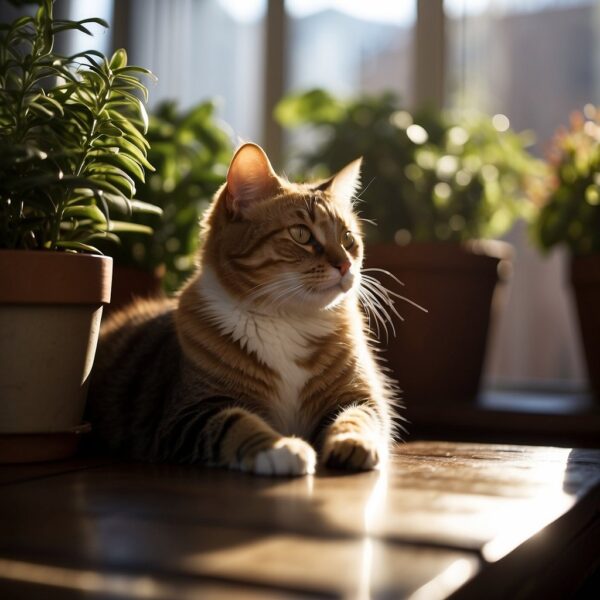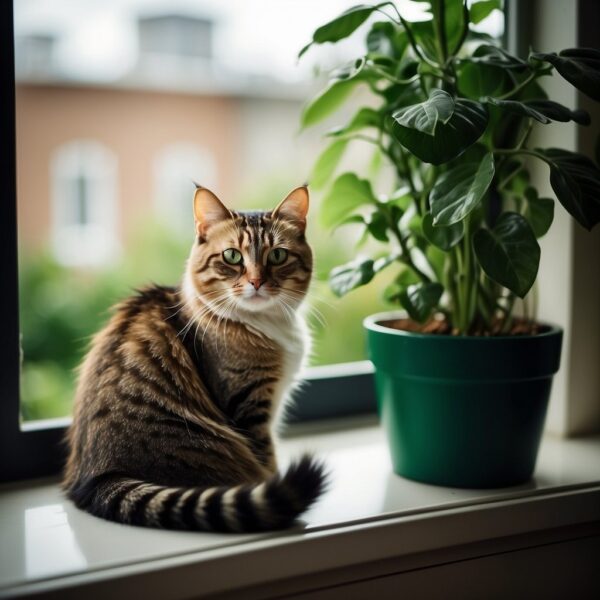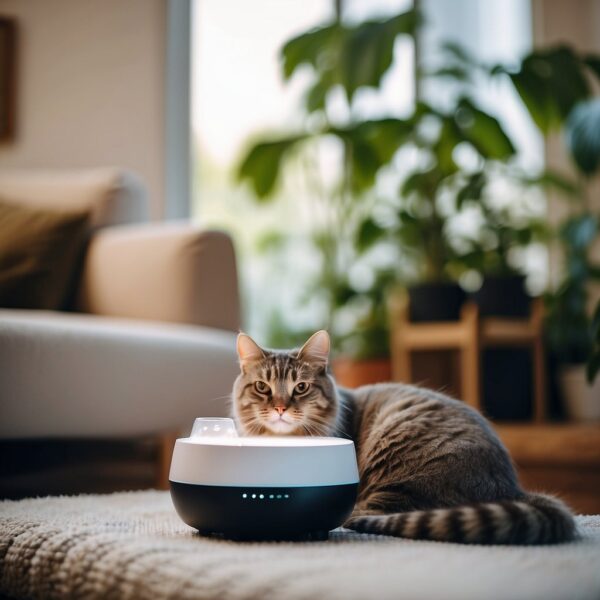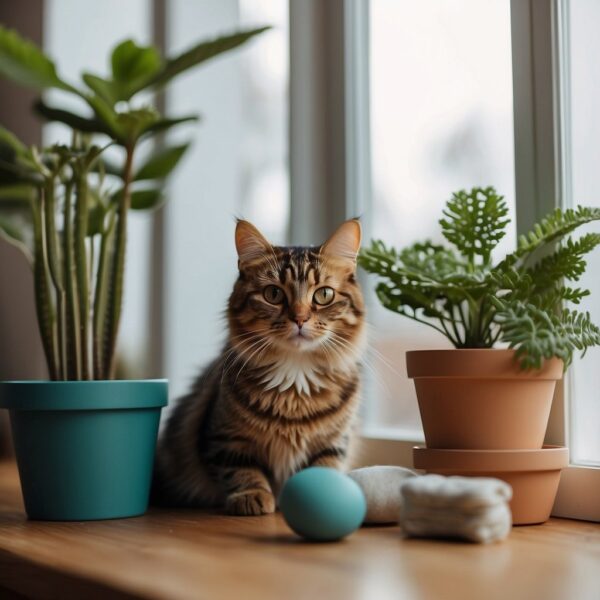
Cat Safe Ways to Freshen Home: Natural Solutions for Pet-Friendly Scents
Maintaining a fresh and clean living space is a common goal for many homeowners, but for those sharing their homes with feline friends, the choice of cat safe home freshening methods becomes a critical consideration. Cats have sensitive respiratory systems, and many common air fresheners contain chemicals that could be harmful to their health. Consequently, it is essential to identify products and practices that keep the air pleasant without compromising the wellbeing of cats.
The market does offer cat-safe alternatives that serve as both air fresheners and purifying agents. These alternatives often include natural ingredients and substances known for their safe, odor-neutralizing properties. Understanding which products and practices are safe is the cornerstone of creating a cat-friendly, fresh-smelling home environment. Baking soda, certain essential oils, and activated charcoal are some of the options that can replace traditional air fresheners. Employing these natural solutions can ensure that the air in your home remains fresh without the risks associated with chemical-laden air fresheners.
Key Takeaways
- Identifying cat-safe air fresheners is vital for pet health.
- Natural alternatives can effectively freshen homes without harm to cats.
- Knowledge of safe scents is essential for cat-friendly air freshening practices.

Understanding Cat Safety and Air Fresheners
When it comes to maintaining a fresh home with pets, cat parents must ensure that the air fresheners they use are free from chemicals that can harm their feline companions. Cats possess a delicate sense of smell and are particularly sensitive to certain toxic ingredients that can be found in some air fresheners.
Toxic Ingredients to Avoid
Several common chemicals found in air fresheners could be toxic to cats. Parents should carefully read labels and avoid products containing the following substances:
- Phthalates: Chemical compounds that can disrupt endocrine functions and may cause long-term health issues.
- Formaldehyde: A known carcinogen that can also cause respiratory distress and skin irritation in cats.
- Essential oils: While popular for their natural scents, certain essential oils like eucalyptus, citrus, and pine can be toxic if inhaled or ingested by cats.
- Propellants: These are often used in aerosol sprays and can cause breathing difficulties or other health issues in cats.
The table below outlines key ingredients to avoid in air fresheners:
| Toxic Ingredient | Potential Harm to Cats |
|---|---|
| Phthalates | Endocrine disruption |
| Formaldehyde | Carcinogenic effects |
| Essential oils | Toxicity when inhaled |
| Propellants | Respiratory distress |
The Feline Sense of Smell
Cats rely on their sense of smell for survival, so it is vital to consider how air fresheners may affect this crucial sense. Their olfactory system is highly developed and can be sensitive to strong fragrances. Overwhelming smells, even those undetectable to humans, can cause stress or behavioral changes in cats. Because of their keen smell:
- Homeowners should opt for air fresheners with mild and neutral scents.
- It’s advisable to provide ample ventilation when using any type of air freshener to help disperse the scent and reduce intensity.
- Unscented or naturally-scented options are often safer alternatives to keep the home environment comfortable for cats.

Natural Alternatives for cat safe Home Freshening
When seeking methods to eliminate odors without compromising the safety of feline companions, homeowners often turn to natural alternatives such as baking soda, activated charcoal, and vinegar. These substances offer effective odor neutralization without the use of harsh chemicals.
Baking Soda Uses
Baking soda, or sodium bicarbonate, is a versatile substance that neutralizes odors by balancing pH levels. Homeowners can use it in several practical ways:
- Sprinkling a thin layer of baking soda on carpets, letting it sit for 15 minutes, and then vacuuming it up can help absorb pet odors.
- Placing an open box of baking soda in a refrigerator or any musty space can help to absorb unwanted smells.
Activated Charcoal Benefits
Activated charcoal is known for its porous structure and absorptive capabilities, making it an excellent natural deodorizer:
- Homeowners can place activated charcoal sachets in areas prone to unpleasant odors to capture and trap offensive smells.
- Charcoal air purifiers can also be utilized to maintain a fresh environment, as they draw in odors and impurities from the air.
Vinegar Solutions
Vinegar is an acidic liquid that can dissolve residue that harbors odors. It is particularly effective due to its disinfecting properties:
- Wiping surfaces with a mixture of equal parts water and vinegar can help to eliminate cooking odors and pet scents.
- Filling a bowl with vinegar and placing it in a room overnight can help to absorb stubborn smells.

Cat Safe home freshening Scents and Aromatherapy
Creating a pleasant atmosphere in a home with cats requires careful consideration to ensure the safety of these sensitive animals. Specific essential oils, when used correctly, can be part of a cat-friendly aromatherapy regime; however, identifying non-toxic products and employing safe DIY methods is crucial when freshening the air.
Do Not USE Essential Oils in your home with Cats
While essential oils can have various benefits for humans, including mood enhancement and symptom relief, they pose significant risks to cats and can be potentially toxic to them. It’s generally advised against using essential oils on or around your cat.
Cats are particularly vulnerable to illness when exposed to essential oils through inhalation from home diffusers, as well as direct contact with the oils on their skin. Given their penchant for self-grooming, if a cat licks essential oil residue from their fur, it can lead to poisoning or severe illness. While some oils are more hazardous than others, any contact with them should prompt close observation of the cat, and immediate veterinary attention if any signs of illness manifest.
Choosing Safe Scented Products
When selecting products to freshen the home, one should opt for hypoallergenic and cat-friendly air fresheners clearly labeled as safe for pets. It’s advisable to choose air fresheners that are non-aerosol and free from volatile organic compounds (VOCs), as these substances can be irritating or harmful to cats.
- Look For: Non-toxic, Hypoallergenic labels
- Avoid: Aerosols, VOCs, Unknown ingredients

Cat-Safe home Freshening Practices
In ensuring a clean, pleasant-smelling home that is safe for cats, cat parents should prioritize methods that do not compromise their cat’s health. Emphasis should be placed on natural, non-toxic approaches specifically tailored for a cat-friendly environment.
Proper Ventilation
Fresh air is the most natural and effective way to eliminate odors. Cat owners should make it a habit to open windows daily to allow cross-ventilation, which helps in dissipating indoor pollutants and pet odors. Use of window screens is recommended to provide safety for indoor cats.
Regular Cleaning Routines
Routine cleaning is essential in maintaining a fresh home. Frequent vacuuming can reduce pet dander and hair, which contribute to odors. Litter boxes should be cleaned regularly—at a minimum, guardians should scoop waste daily and change the litter according to the manufacturer’s instructions. Surfaces and fabrics also benefit from regular washing or wiping, as this prevents odor buildup.
Deodorizing Cat Areas
Selecting pet-friendly air fresheners is crucial for cats’ well-being. Here are specific recommendations for safe deodorization:
- Natural options: Baking soda can be sprinkled in areas such as the litter box to neutralize odors without the use of harsh chemicals.
- Pet-safe products: Choose air fresheners that are explicitly labeled as non-toxic and safe for pets. It is important to ensure these products do not contain essential oils that can be harmful to cats.
By incorporating these practices, cat parents can create a fresh environment that aligns with the safety and comfort of their feline friends.
Additional Considerations for Cat parents
When maintaining a fresh home, cat parents must manage litter box odors, ensure proper grooming, and select non-toxic cleaning products, considering the impact on their cat’s health and well-being.
Managing Litter Box Odors
Regular cleaning of the litter box is fundamental for controlling odors. It’s recommended to:
- Remove waste daily and completely change the litter weekly.
- Consider clumping, odor-controlling litter that is free of fragrances and chemicals which can be safer for cats.
Selecting Non-toxic Cleaning Products
Choosing the right cleaning products is crucial as certain chemicals can be harmful to cats. Parents should:
- Look for “cat-safe” on labels and research ingredients for any potential toxicity to cats. Remember if an ingredient is safe for dogs it does not mean it is safe for cats!
- Implement the use of natural cleaning solutions such as baking soda, vinegar, and hydrogen peroxide as non-toxic alternatives for air freshening.
Final Thoughts on cat safe home freshening
When cat parents look to freshen their homes, the well-being of their furry companions stands paramount. They seek methods that are not only effective in eliminating odors but also safe for their cats. Here’s a concise guide on freshening your home:
- Safety: Always prefer products with clear non-toxic labels and certifications ensuring they’re safe for cats.
- Odor Elimination: To effectively neutralize odors, consider air purifiers with HEPA filters.
- Natural Alternatives: Items such as baking soda and activated charcoal absorb odors without using harsh chemicals.
Certifications: Look for asthma & allergy-friendly certifications on air freshening products.
It’s essential to be informed about the products one uses around cats, as their sensitivity to certain substances can lead to adverse reactions. A clean, fresh home and a healthy cat are not mutually exclusive; with the right products and practices, they go hand-in-hand.
Frequently Asked Questions about cat safe home freshening
The health and safety of feline companions is a priority when freshening homes. This section addresses common concerns regarding cat-safe practices for maintaining a refreshing environment.
What are the best cat-safe methods to eliminate cat urine odor?
One can use an enzymatic cleaner specifically designed for pet odors to safely break down cat urine molecules. Additionally, baking soda can be sprinkled on affected areas and vacuumed after a few hours to absorb odors.
How can I create a homemade air freshener that is safe for cats?
A homemade air freshener can be made using ingredients like diluted vinegar or lemon juice in a spray bottle.
What are natural ways to deodorize my home without harming my cat?
They can use natural deodorizers such as activated charcoal, baking soda, or zeolite crystals to eliminate odors. Placing these substances in breathable containers around the home will help absorb unwanted scents without the use of chemicals.
What commercial air fresheners are considered safe to use around cats?
Commercial air fresheners deemed safe for cats are typically non-toxic and free of volatile organic compounds (VOCs). Brands often advertise their products as pet-friendly, but it is crucial to read labels and choose options that do not contain harmful chemicals.
Are there any safe plug-in air fresheners that won’t harm cats?
While many plug-in air fresheners may contain ingredients harmful to cats, there are products available that use a safe, heat-released mechanism to diffuse cat-friendly scents. It’s essential to verify that the chosen product is labeled as non-toxic and safe for cats.
How can I naturally freshen my home’s air with a cat around?
They can open windows to encourage ventilation and use fans to circulate air. Indoor plants that are non-toxic to cats can also improve air quality while adding to home aesthetics. However, it is important to research plants thoroughly as some may be harmful if ingested by cats.